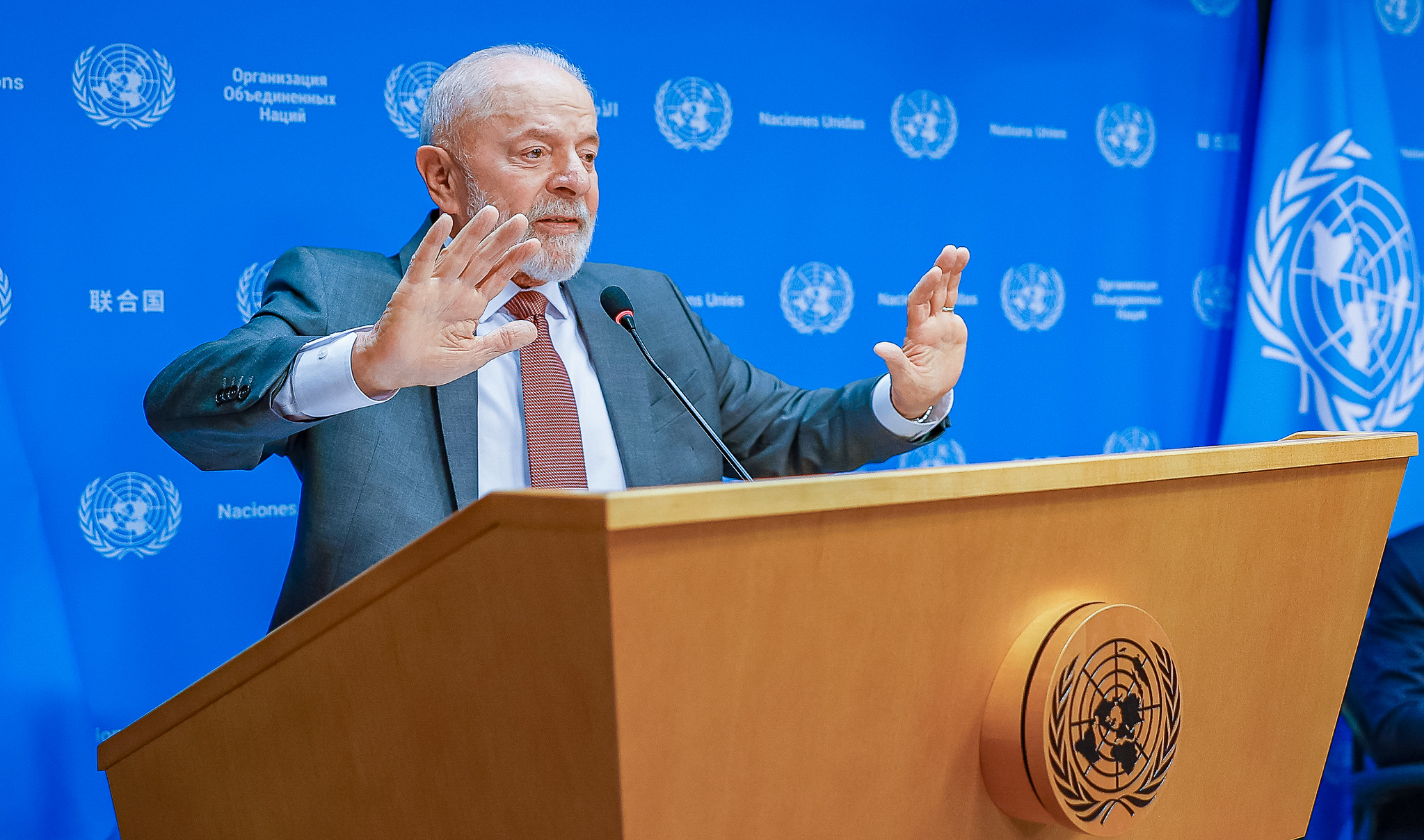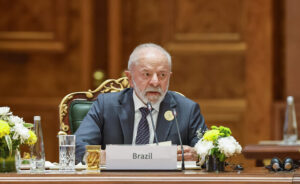
Published 09/25/2024 18:25 | Edited 09/25/2024 18:52
At a press conference held in New York, President Luiz Inácio Lula da Silva addressed key issues related to his participation in the UN General Assembly and reaffirmed Brazil’s position in defending an urgent renewal of the United Nations. The press conference, marked by a firm and hopeful tone, reflects Lula’s efforts to strengthen Brazil not only internally, but also on the global diplomatic scene, promoting dialogue and inclusion as the foundations of his government.
During his opening speech, Lula highlighted the importance of adapting the organization to current geopolitical changes and global challenges, which are very different from those of 1945, when the UN was founded.
“When the UN was created, there were 51 countries. Today there are 193. Today’s geopolitics are different from the geopolitics of 1945. What we are advocating is a new geopolitical structure so that all continents are represented,” said the president, reiterating the need to reform the Security Council, including eliminating the right of veto.
The G20 leader also responded firmly to criticism from Ukrainian President Volodymyr Zelensky, criticized Israeli Prime Minister Benjamin Netanyahu for the escalation of the war in the region and also highlighted the reasons for his meetings with risk agencies and the American oil explorer Shell.
Read also: Mauro Vieira announces Brazil’s achievements and initiatives at the G20
Global conflicts and the lack of governance
Lula drew attention to the lack of global governance, which, according to him, has allowed conflicts to multiply around the world. Referring to the war between Russia and Ukraine, as well as recent conflicts in the Middle East, Lula noted that, despite decisions and debates at the UN, no concrete solution has been implemented.
“The UN had the power to create the State of Israel, but now it does not have the power to create the Palestinian State. We need a diplomatic solution, and Brazil has insisted on discussing peace,” he said, highlighting his government’s efforts to seek dialogue between the parties involved, such as the work of Celso Amorim, special advisor to the presidency, in negotiations with Russia, China and Ukraine.
Extremism and defense of democracy
Another point highlighted by the president was his concern about the rise of extremism, which, according to him, has found support in the disinformation and fake news industry, which has become a lucrative business in many parts of the world. For Lula, the rise of the far right puts democracy itself at risk, a system he considers the most extraordinary form of government.
“We have called a meeting with democratic presidents to discuss the revitalization of democracy and the emergence of the far right. We need to understand where democracy went wrong to allow this extremism to gain strength,” said Lula, referring to the event organized jointly with President Pedro Sánchez of Spain, also on the sidelines of the UN General Assembly.
Brazil and the energy transition
In addition to the diplomatic and political challenges, Lula highlighted the opportunities that Brazil has in the area of renewable energy. With 90% of its energy matrix already based on renewable sources, the country has, according to him, the potential to lead the global energy transition, highlighting the role of ethanol, biodiesel and the expansion of solar and wind energy.
“Brazil has the potential to be an example to the world, with the cleanest energy on the planet. We will not waste this opportunity,” he declared, recalling that the country has been mixing ethanol with gasoline for 50 years and is expanding its use of biodiesel.
Economic growth and social inclusion
Lula spoke optimistically about the growth of the Brazilian economy and the recovery of investor confidence, as well as efforts to reduce social inequality and eradicate hunger. He celebrated recent achievements, such as lifting millions of people out of poverty and the approval of important reforms in the National Congress, such as tax reform.
“When I returned to the presidency, Brazil had 33 million people going hungry. We have already managed to get 24 million out of this situation, and by the end of my term I want all children to have breakfast, lunch and dinner,” the president promised.
Lula condemns genocide caused by Netanyahu and criticizes global inaction
During the press conference, President Lula strongly condemned the escalation of violence in Lebanon and Israel’s actions, calling the situation a genocide. When asked by a journalist from the Turkish Anadolu news agency about the high number of civilian deaths and plans for an Israeli ground offensive, Lula expressed deep concern about the worsening humanitarian crisis.
“It is important to remember that the total number of deaths in Lebanon has now reached 620 people, the highest number since the civil war that lasted from 1975 to 1990,” Lula stressed. He also mentioned the devastating impact on women and children: “94 women and 50 children have died, in addition to 10,000 people who have been forced to flee their homes.” Lula expanded his analysis, pointing out that in the occupied West Bank, the violence has already resulted in more than 5,700 injuries and the death of 160 children.
According to the president, the international community has been negligent, and UN resolutions have been ignored by the Israeli government, led by Benjamin Netanyahu. “There have been several ceasefire attempts approved by the UN Security Council, but Israel has not complied with them,” he said. He argued that the UN needs to be strengthened so that it has the power to make decisions and ensure the implementation of peace agreements.
Lula did not hold back in his criticism of international support for Israel, calling on the countries that support the Netanyahu government to do more to stop what he called genocide in the Gaza Strip. “We are fighting to improve the quality of life on the planet, while human beings continue to kill each other. This makes no sense,” concluded the president.
Diplomacy and Brazil’s role in the energy debate
During the press conference, Lula was also asked about a recent meeting with Shell representatives, who expressed interest in oil exploration on Brazil’s equatorial margin. Some government officials expressed discomfort with the apparent contradiction between the quest for decarbonization and the incentive to explore oil.
The president was categorical in his response: “I see no contradiction. Shell has been in Brazil for over 100 years, even before I was born. They will only go to the equatorial margin if the Brazilian government, within environmental requirements, allows it.” Lula argued that, until there is self-sufficiency in other energy sources, Brazil still needs oil to guarantee its energy security.
He stressed the importance of transforming Petrobras into an energy company, and not just an oil company, so that the country is prepared for the future, when the use of fossil fuels is reduced.
Global Alliance Against Poverty and Hunger
Lula also addressed his initiative for the Global Alliance Against Inequality, Hunger and Poverty, highlighting the broad acceptance of the project by global leaders. “So far, all the countries we have spoken to are willing to participate. There is no president who would refuse such a noble cause,” he said.
The president shared Brazil’s experience in combating poverty, with programs such as Bolsa Família, and suggested that similar policies could be adopted in other regions. “The world produces enough food to end hunger. What is missing is ensuring that people have the resources to buy this food,” said Lula, reinforcing the need to prioritize the poor in national budgets.
Lula responds to Zelensky’s criticism and defends diplomacy for Ukraine
Lula also addressed critical issues on the international agenda, including recent statements by Ukrainian President Volodymyr Zelensky, who mentioned Brazil at the UN Security Council. Zelensky criticized the “colonial” view that, according to him, some countries have of the situation in Ukraine, rejecting any peace proposal that does not include the full preservation of the country’s territorial integrity and sovereignty, in addition to expressing discontent with the rapprochement between Brazil and China.
Lula, in response to the criticism, stated that Zelensky “only stated the obvious,” emphasizing that the Ukrainian president has the right and duty to defend his country’s sovereignty. “What he is not managing to do is make peace,” commented the Brazilian leader, reiterating that his proposal, like that of China, is not about imposing a solution, but rather about encouraging dialogue. “They don’t need to accept the proposal from China and Brazil because there is no proposal. There is a thesis that it is important to start talking,” explained Lula.
For the president, the solution to the conflict necessarily involves dialogue. He believes that as long as the military confrontation continues, the Ukrainian people will continue to suffer. “If he [Zelensky] If he were smart, he would say that the solution is diplomatic, not military,” he pondered, arguing that the only way to guarantee Ukraine’s survival as a sovereign nation is to sit down and negotiate.
Meetings with risk agencies and structural reforms
In another important point of the interview, Lula commented on his recent meeting with the main credit rating agencies in New York. When asked about the purpose of these meetings, he highlighted the need for the agencies to hear directly from the Brazilian president what is happening in the country, without relying solely on information from the financial market. “You don’t need to listen only to Faria Lima, listen to the workers and the president of the Republic,” he said, referring to the region where most of the financial institutions in São Paulo are concentrated.
Lula made a point of emphasizing Brazil’s economic advances since the beginning of his term. According to him, the market underestimated the country’s growth, but now recognizes a more optimistic forecast, pointing to a growth of 3.5% in 2024. He also highlighted the importance of the recent approval of the tax reform, something that “seemed impossible”, and mentioned the billion-dollar investments in sectors such as the automobile industry, paper and pulp, food and energy.
“This is the country, with all these signs of stability, that we are offering,” declared the president, emphasizing the need for economic and political predictability to attract more investment. Lula also mentioned that, under his leadership, the government is focused on not spending more than it has, emphasizing the importance of taking on debt only for new investments, not for financing.
Progress in the Mercosur-European Union agreement
At another point during the press conference, Lula was asked about the progress of negotiations on the agreement between Mercosur and the European Union, as well as his recent meetings with international leaders, such as French President Emmanuel Macron and the President of the European Commission, Ursula von der Leyen. Lula expressed great optimism regarding the signing of the agreement and said that Brazil is ready to close the deal.
“I have never been so optimistic about the European Union-Mercosur agreement,” said the president. According to him, negotiations have made considerable progress and now the responsibility for their conclusion lies with the European Union. “For 20 years, Mercosur was blamed. We are ready,” he assured.
For the president, the conclusion of the agreement opens doors for new strategic partnerships, not only with Europe, but also with countries such as India and China.
Source: vermelho.org.br

